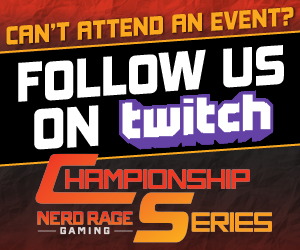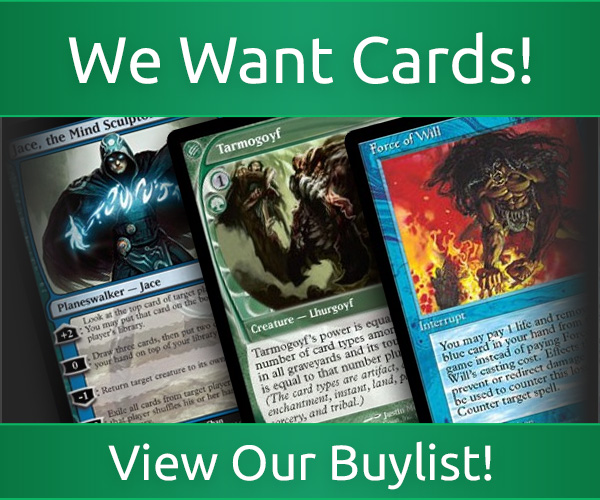Steven Briggs: An Open Letter to Wizards of the Coast
(Editor’s Note: Steven Briggs, a Level 3 judge and Regional Coordinator — USA, Central Region, originally wrote the following post on his personal Facebook page. It is reposted here with his permission and has been lightly edited for style and clarity.)
An Open Letter to Wizards of the Coast,
I am incredibly disappointed and dismayed by your response to recent incidents involving the intimidation of members of our Magic community. Your corporate response is entirely out of touch with what is actually going on in local communities. I do not care about how “disheartened” you are about bullying and harassment — what I care about is what you are going to do about it. As I read through what you are going to do, here is the short list you have provided:
“We are investigating …”
“We are reviewing and updating policies …”
“We are going to be more proactive …”
This response is not acceptable.

Steven Briggs
Not one time, in this entire letter, do you actually own this problem and say “we as a company have not done what we need to do to protect this community.” Not one single time do you accept fault, or accept responsibility for the culture that, through not acting, you have made the choice of creating. We can point fingers at the people very responsible for their individual bad behavior, but at the end of the day, who really owns the community they have or have not created, are the people who produce this game: Wizards of the Coast.
When I read “We diligently promote inclusivity and openness within our community,” I laugh, because I know that is not true. I look at the broad reaching efforts of work by companies like Riot Games, who to this date empirically report that 2 percent of their matches still have problems. Two percent of their matches (5v5) in a pool of 100 million players means that we can give or take at least 200,000 players globally to be problematic, and that’s after countless hours of play have been analyzed and reviewed over years, with a continuous dialogue with the community about it — I have to believe the percentage is higher in a largely unattended situation. Your statement is disingenuous to the point of being entirely insulting.
I have been on the front lines combatting this type of behavior at events for nearly a decade now. And for nearly a decade, our policies have basically boiled down to this:
— At Regular rules level, the player either shows such a concentrated level of abusive behavior that they are disqualified, which does get tracked; or does something less severe, which is systematically forgotten. There is no tracking system for these “smaller offenses” at Regular level events, which make up a massive percentage of events run globally.
— At Competitive/Professional rules level, a more systematic means of tracking penalties is used, but a number of the behaviors even under “Unsporting Conduct – Minor” create situations where the game is essentially unplayable for the non-offending player because they are emotionally on edge from it. It goes into the system as a penalty, but what happens from there — nobody knows. A judge in my region says that in their store, the running joke is that penalties are “shipped off to the void.” There’s no transparency for how these infractions are processed and translated into consequences.
Without tracking like this, players can act abusively in perpetuity without triggering any sort of consequential action against them, so long as their actions in a single event aren’t a complete meltdown. And what are judges and stores supposed to do in these situations, especially if the offending player rotates between multiple stores in an area? This is where a combination of policy and the use of Wizards Event Reporter should fill the gap — by having easier ways of reporting minor problematic behavior locally to catch these repetitive, week-in and -out offenses that form the foundation for harassment. Harassment does not just manifest as one big “pinnacle” event — oftentimes, it can act like a series of body shots in a 12-round fight. The first one doesn’t knock you down, but the 50th shot to the gut does. We need to catch that and stop that pattern before it beats the enthusiasm out of victims.
As I read social media posts this week, I see players owning responsibility for needing to help make Magic a safer community. I see judges taking responsibility and talking about needing to step up efforts to make Magic a safer community. All of this is well and good, but without ownership and actual resources and follow through from Wizards, I don’t see us being any more successful than we are right now. What good is there in asking us to report things when we cannot trust that you’ll actually follow through on any of it?
I want to take a moment to talk about company values. Values are your standards of behavior, what you find most important in who you are and what you do. It is so important that businesses not only express core values, but take steps to show that how they act, what they invest in, what they do, aligns with those values. Ultimately, a set of values defines the relationship you have with your customers and how you will respond in challenging situations.
As was eloquently expressed by others this week, Magic: the Gathering is about “the Gathering” — that is to say, our community. If community is a value that Wizards has, then I must ask, where are the resources to support that value? Where are the people, where is the technology, and why haven’t you been investing in this for years? Your competitors certainly have and continue to.
Furthermore, I would argue that based on the behaviors demonstrated to this point, in terms of player management, the relationship with retailers, and the “relationship” with the officiating community, Wizards is guided by different operating principles:
- Sell as much product as we can.
- Make as much money as we can.
- Avoid getting sued.
That’s it. That’s all there is. We can support and follow and like individuals that work for the company as much as we want, but at the end of the day, when it comes to how this company has crafted policies and acted on situations, there’s no level of real commitment to actual safety at events or actual enforcement of conduct standards on a broad scale specifically by Wizards. Why? It costs real dollars to hire Wizards employees to do these things. It costs real dollars to make sure these employees are at large events. It costs real dollars to have the courage to tell an individual or store that they cannot participate in events anymore for failing to uphold standards of conduct. These things don’t fit the core principles actually being subscribed to. You’re more worried about attempting to command the community to report leaks of your intellectual property than you are about actually protecting the community that you want to protect you. The lawyers run the roost, that much is certain, and that’s how you got into this situation to begin with — through permissiveness via avoidance. Not speaking out, not acting publicly, not taking action is tacitly accepting the abhorrent behavior as a cost of doing business.
With all of that said, this is the action plan I am recommending to combat these issues:
— Build a large, dedicated team for player management that is actually immersed in the community. This includes having a regular dialogue with the community and leveraging a more robust group of people actively seeking out abusive behavior and removing those responsible for it from the community.
— Adopt and enforce stronger standards of conduct, which include strong and concrete consequences tracked across all levels of Organized Play. The visibility of the conduct should not matter — if you’re a jerk, you should be punished for it.
— Establish and enforce clear consequences for breaking these standards, including a path toward reform for the party involved if the infraction is not serious. We want players to improve their behavior, and I do believe most are able to do that with firm intervention.
— Indefinitely ban players for egregious or repeated violations of these standards.
— Suspend and/or indefinitely ban retail locations who refuse to enforce these standards.
— Utilize technology in online spaces to not just filter bad language, but to enforce immediate disciplinary action when it is used. This can be automated or reported or a combination of the two — there are a number of solutions already being used by competitors — as long as it is clear, easy to use, and will actually be acted on, then it’s a win.
At the end of the day, no matter how hard I or anyone else works to promote a safer, friendlier Magic community, real action toward reforming conduct begins at the top. Without strong actions to support players, judges, and tournament organizers across all platforms in a consistent manner, I do not believe the individual efforts of many outstanding people will be completely effective. I believe where we are at now is evidence of that. We need a true adoption by Wizards of community as a value, sustained by strong standards of conduct and resources dedicated to enforce those standards to be successful.
This community’s outcry has shown that it strongly desires to partner with you, Wizards, but you have to be willing to commit with equal strength, with equal tenacity, toward that objective. Do you have the courage?
Steven Briggs is a level 3 judge and Regional Coordinator, USA — Central Region. Questions and comments about this article can be posted below or emailed to Nerd Rage Gaming Communications Manager casey@nerdragegaming.com.



